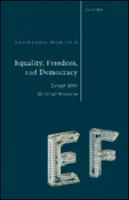Equality, Freedom, and Democracy
Europe After the Great Recession
Abstract
A democratic regime is assumed to implement freedom and equality as the two critical and most important values. The question we intend to address here is: how and why has the actual implementation of freedom and equality been changing in the 1990–2020 period? Researching this topic, we cannot ignore the impact of the Great Recession since 2008. Thus, in this comparative research, we analyse France, Germany, Italy, Poland, Spain, and the United Kingdom to detect the changes. As expected, the six largest European democracies have been differently affected by the crisis, as they also had different background factors. We address an additional question: what is the impact of the European Union on the two democratic values? Accordingly, we analyse economic inequality, social inequality, and ethnic inequality with the related changing trends and explanations. We also detect and analyse the trend of freedoms, and especially personal dignity, civil rights, and political rights. Thus, the relative decline of equalities and freedoms in the six countries emerge in the different complex facets. We also explore the demand for equalities and freedoms by citizens and the political commitments of party leaders. The other issues we address include how and why, respectively, equalities and freedoms are affected by domestic aspects and the role of external factors, especially the European Union. By connecting equalities and freedoms and drawing the lines of entire research, we show how there are three different paths in the future of democracy: balanced democracy, protest democracy, and unaccountable democracy.
Keywords
democracy; equality; freedom; great recession; inter-institutional accountability; rule of law; responsivenessDOI
10.1093/oso/9780198813873.001.0001Publisher
Oxford University PressPublisher website
https://global.oup.com/Publication date and place
Oxford, 2020Classification
Comparative politics
Political economy
EU (European Union)


 Download
Download Web Shop
Web Shop